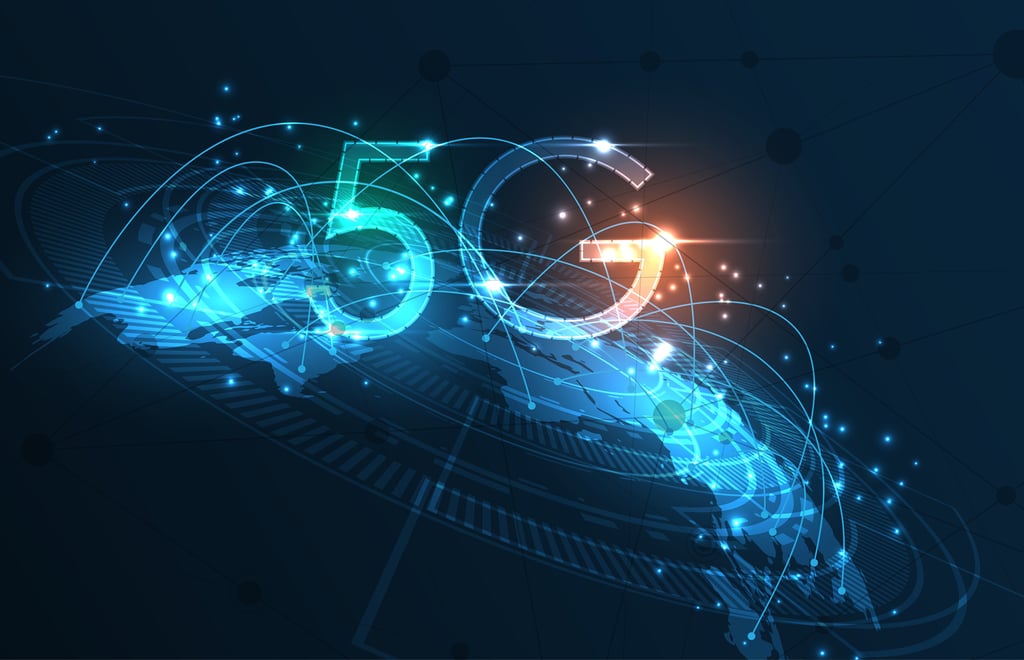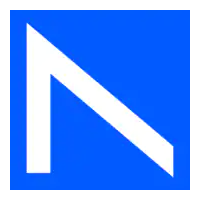

5G label on a virtual halfglobe with interconnected points.
Compare the leading 5G business internet providers. Evaluate features, coverage, and reliability to discover which provider best suits your organization’s needs.


According to a study by Precedence Research, the 5G business internet market is projected to be a USD 47.07 billion market by 2032, growing at a staggering CAGR of 32.6% from 2023 to 2032.
There are good reasons for this impressive forecast.
The transformative potential of 5G runs the gamut from lighting fast downloads to enabling a new generation of technologies and capabilities such as IoT, autonomous vehicles, remote medicine, and smart cities.
In particular, 5G business internet is set to revolutionize the way companies operate, offering unprecedented speed and reliability that can facilitate seamless remote work, real-time data analysis, and advanced automation.
This technology is not just about faster internet; it is about enabling a new era of connectivity that can drive innovation, efficiency, and growth in businesses across all sectors.
Here are our top picks for 5G business internet providers of 2023:
The following comparison table provides a snapshot of key features across the five leading 5G business internet providers: AT&T, Ericsson, Nokia, T-Mobile, and Verizon.
| High-speed connectivity | Low latency | Network slicing | Massive connectivity | Enhanced Mobile broadband (eMBB) | Starting price | |
|---|---|---|---|---|---|---|
| Verizon | Yes | Yes | Yes | Yes | Yes | $69/month |
| T-Mobile | Yes | Yes | No | Yes | Yes | $50/month |
| AT&T | Yes | Yes | Yes | Yes | Yes | Contact for Pricing |
| Ericsson | Yes | Yes | Yes | Yes | Yes | Contact for Pricing |
| Nokia | Yes | Yes | Yes | Yes | Yes | Contact for Pricing |
Jump to:

Best for comprehensive 5G business solutions
Verizon, a leading telecommunications company, offers comprehensive 5G business solutions that are designed to cater to a wide range of business needs. Verizon’s 5G business internet service is built on their 5G Ultra Wideband network, offering high speed, low latency, and massive capacity. This makes it a top choice for businesses that require reliable and fast connectivity for their operations.

Best for small businesses
T-Mobile, an American wireless network operator, offers 5G business internet services that are designed to be both affordable and user-friendly. T-Mobile’s 5G business internet service is aimed at small businesses, offering unlimited data backed by their extensive 5G network.

Best for symmetrical speeds
AT&T Business is a notable player in the 5G business internet landscape, particularly recognized for its symmetrical speeds. This means businesses can expect similar upload and download speeds, a feature that can be crucial for operations that involve large data transfers, such as cloud computing and video conferencing.
AT&T Business also offers a mobility feature, which can be beneficial for businesses with remote or mobile workforces. In addition, they provide a wireless broadband backup option, which can be a valuable safety net in case of power outages or primary service disruptions.

Best for energy efficiency
Ericsson, a Swedish multinational networking and telecommunications company, has been heavily involved in the development of 5G standards and technology.
The company’s 5G solutions aim to address a wide array of business needs, from high-speed data transfer to massive device connectivity.

Best for massive machine type communication
Nokia, a Finnish multinational telecommunications, information technology, and consumer electronics company, is recognized for its comprehensive portfolio of 5G products, services, and licensing opportunities.
Nokia’s 5G solutions are designed to support a wide range of use cases, including enhanced mobile broadband, massive machine type communication, and ultra-reliable low latency communication.
If you are in the market for 5G business internet, there are several key features that make it a great business option, including its trademark high-speed connectivity and low latency, plus enhanced elements like network slicing and massive connectivity.
One of the most significant advantages of 5G business internet is its high-speed connectivity. 5G networks can offer speeds that are significantly faster than those of previous-generation networks. This means that businesses can download and upload data more quickly, which can improve efficiency and productivity.
High-speed connectivity can be particularly beneficial for businesses that rely on real-time data transfer, such as those in the financial services or healthcare sectors.
5G networks also offer low latency, which is the time it takes for data to travel from one point to another. Low latency can improve the performance of business applications, particularly those that require real-time interaction, such as videoconferencing or online gaming.
For businesses, low latency can mean smoother video calls, faster load times, and improved responsiveness in applications.
Network slicing is a unique feature of 5G networks that allows businesses to create multiple virtual networks within a single physical 5G network. This can be particularly useful for businesses that have varying needs for different parts of their operations.
For example, a business might require a high-speed, low-latency network slice for its real-time applications, and a separate, high-capacity slice for its data-intensive applications.
5G networks are designed to support a massive number of devices simultaneously. This can be particularly beneficial for businesses that use IoT devices, as it allows them to connect more devices to the network without impacting performance. Massive connectivity can enable businesses to deploy IoT solutions on a larger scale, improving efficiency and data collection.
Enhanced Mobile Broadband (eMBB) is a feature of 5G networks that provides high-speed broadband connectivity on mobile devices. This can enable businesses to provide their employees with high-speed internet access on the go, improving flexibility and productivity.
Choosing the best 5G business internet for your business is a crucial decision that can significantly impact your operations and productivity. The best choice will depend on your specific needs, the nature of your industry, and the unique features that different providers offer.
For example, if your business relies heavily on real-time data transfer and applications, providers like AT&T, Ericsson, and Verizon, which offer high-speed connectivity and low latency, could be a good fit. These features can improve the performance of real-time applications, making operations smoother and more efficient.
Businesses in sectors like manufacturing, logistics, or retail that use a large number of IoT devices will find the massive connectivity offered by all five providers — especially Nokia, Ericsson, and Verizon — can be a game-changer. This feature allows a large number of devices to be connected simultaneously without impacting network performance, enabling businesses to scale their IoT solutions.
If your business requires different network capabilities for different operations, the network slicing feature offered by AT&T, Ericsson, Nokia, and Verizon could be particularly beneficial. This feature allows businesses to create multiple virtual networks within a single physical 5G network, each tailored to specific needs.
For businesses with a mobile workforce, the Enhanced Mobile Broadband (eMBB) feature offered by all five providers can provide high-speed internet access on mobile devices. This feature can improve flexibility and productivity, allowing employees to access high-speed internet wherever they are.
Lastly, pricing is an important consideration. T-Mobile and Verizon offer clear pricing models, with T-Mobile’s 5G business internet service starting at $50 per month and Verizon’s starting at $69 per month. AT&T, Ericsson, and Nokia require businesses to contact them for pricing, which could offer more flexibility but also makes quick comparisons more difficult.
5G can be used in businesses in several ways:
Businesses should adopt 5G for several reasons:
Despite the clear advantages, there are several potential drawbacks for businesses using 5G:
We evaluated each provider based on several key aspects of 5G business internet services, including speed and reliability, coverage, pricing, customer service, and unique features.
Primary data about each provider was gathered directly from the vendor’s website, ensuring that our information is up-to-date and accurate. We also took into account the provider’s reputation in the industry and their commitment to innovation in the 5G space.
We also analyzed user feedback on various review websites. This allowed us to gain insights into the real-world performance of these providers and their services, as well as the experiences of businesses that use them.
Choosing the right 5G business internet provider is a critical decision that can significantly impact your business operations. The majority of 5G business internet services in the U.S. are provided by the five companies discussed in this article. Each provider offers a unique set of features and options that cater to different business needs.
While AT&T, Ericsson, Nokia, T-Mobile, and Verizon are all leading providers, the 5G business internet market is rapidly evolving, and new providers may emerge in the future. As the 5G landscape continues to evolve, staying informed about the latest offerings and advancements can help you make the most of this transformative technology.
Once you have your 5G provider picked out, don’t forget to fortify your network. Here are some particular 5G security concerns to watch out for.


Kihara Kimachia is a writer and digital marketing consultant with over a decade of experience covering issues in emerging technology and innovation. In addition to appearing regularly in Enterprise Networking Planet, his work has been published in many leading technology publications, including TechRepublic, eSecurity Planet, Server Watch, Channel Insider, IT Business Edge, and Enterprise Storage Forum.

Enterprise Networking Planet aims to educate and assist IT administrators in building strong network infrastructures for their enterprise companies. Enterprise Networking Planet contributors write about relevant and useful topics on the cutting edge of enterprise networking based on years of personal experience in the field.
Property of TechnologyAdvice. © 2025 TechnologyAdvice. All Rights Reserved
Advertiser Disclosure: Some of the products that appear on this site are from companies from which TechnologyAdvice receives compensation. This compensation may impact how and where products appear on this site including, for example, the order in which they appear. TechnologyAdvice does not include all companies or all types of products available in the marketplace.